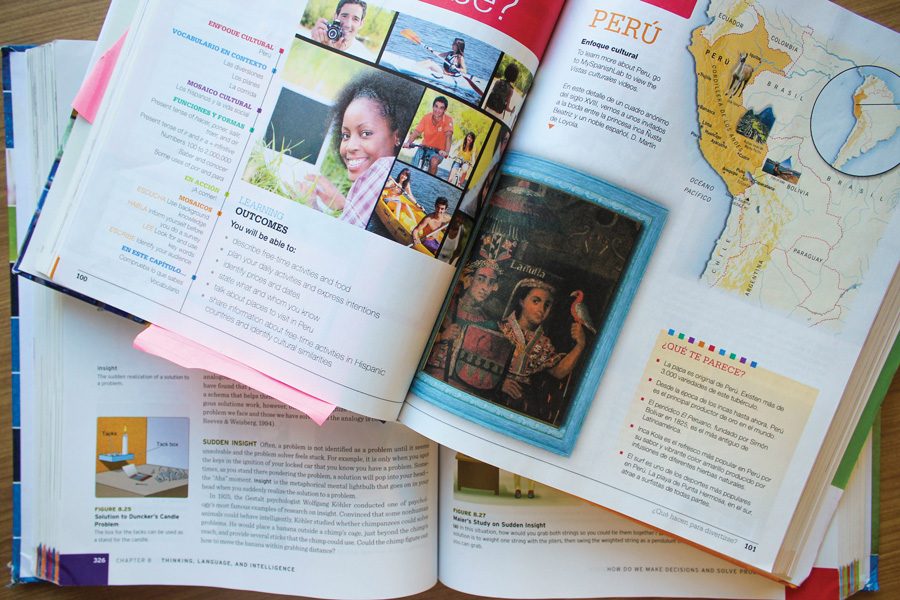What textbook companies will do to get professors to buy their product
Zoe Malin/The Daily Northwestern
A spanish textbook. Textbooks are extremely expensive, but the publishing companies go to great lengths to keep the University’s business.
October 25, 2018
This story is part of a series investigating textbook costs at Northwestern.
Mathematics Prof. Eric Zaslow has more than once arrived at work to see a basket of muffins on the math department desk. The gift, more often than not, is from a textbook representative trying to curry favor with the professors.
“I’ve wanted to bar the practice of textbook companies coming around and leaving muffins and so on, because it creates an appearance of impropriety,” Zaslow said. “I think it’s improper in the first place, more so than just the appearance.”
Muffin baskets are only one example of the tactics textbook publishers use to persuade professors to adopt their books and materials. Most of the time, the companies are a little more subtle.
Economics Prof. Scott Ogawa has access to a PDF of his introductory microeconomics textbook. That PDF, which he occasionally consults to assign homework, is free. But it’s only free for him, he said. His students still have to pay for the text themselves.
Sending professors free textbooks is common practice, but some companies will also provide free copies for teaching assistants, Ogawa said.
To some professors, these incentives are exactly what they sound like — not so subtle suggestions to buy the most recent edition of a textbook or supplementary materials. Ogawa said the free PDFs, for example, are a gift contingent on the purchase of the most recent version of a textbook.
Some professors recognize the inherent problems with the way textbook companies interact with the University, Ogawa added, but textbooks are essential for many classes. In fact, publishing companies go to great lengths to keep professors’ business.
“You’ve got some publishers emailing you every two weeks saying ‘Can I get you this, can I get you that?’” Ogawa said. “They’re sending you free copies, they’re having you read end of chapter problems and paying you two hundred bucks to keep you.”
If professors refuse those offers, there’s always the oldest trick in the book: competitive pricing. Mathematics Prof. Aaron Peterson describes the textbook market as “cutthroat.”
“They want our business,” he said. “If a publisher wants to raise prices we can always go to another publisher.”
Through what Peterson calls “vigorous” negotiation with publishing company Cengage, the math department at Northwestern has managed to lower the price of its calculus textbook considerably.
Textbook companies, Peterson said, treat universities like they’re “clients purchasing a product” even though the eventual consumers of the product are students.
But if the University is responsible for students, instructors’ first priority should be to assure that the students can afford to learn, said Communication sophomore Rahma Almajid.
This means allowing the use of alternative textbooks, providing notes or PDFs online, to a certain extent, resisting the temptation of the muffin baskets and free instructor copies.
“The reason the University is even here is for the students,” Almajid said. “No matter how persuasive these textbook companies might be, (professors) should always take students into account.”
Email: [email protected]
Twitter: @cam_e_cook


